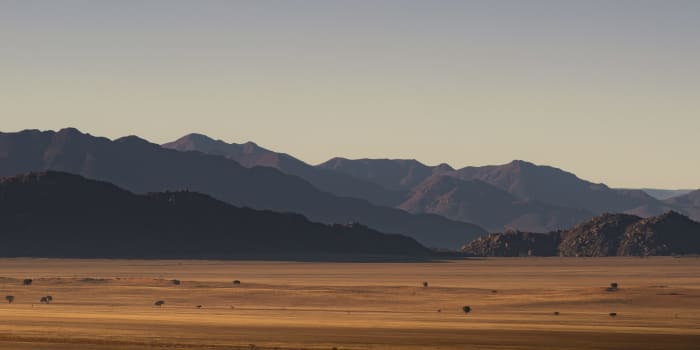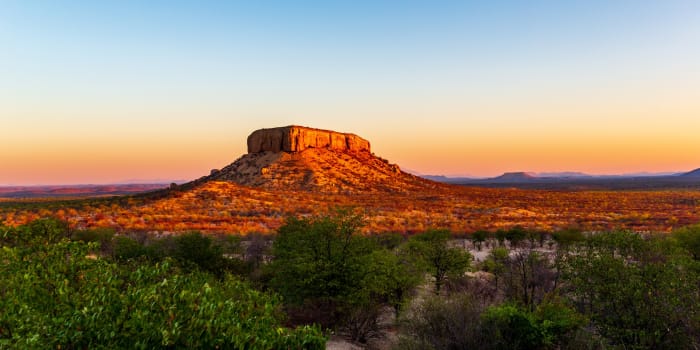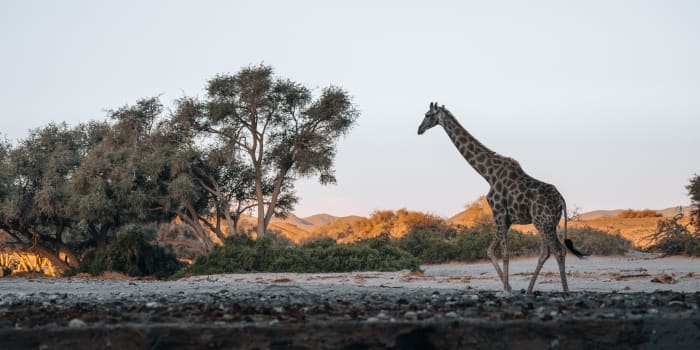
Etosha National Park
A paradise in Namibia
In the vastness of Namibia, where the sun kisses the horizon and the stars light up the night sky, lies a place of breathtaking beauty and boundless wilderness: Etosha National Park. This nature reserve, one of the largest in Africa, is a true paradise for nature and animal lovers and is considered one of the highlights of Namibia. With its impressive biodiversity and untouched nature, the national park captivates travelers from all over the world year after year and is a must-see on any trip to Namibia.
Etosha National Park covers an area of around 22,270 square kilometers and is home to an incredible variety of animal species, including elephants, rhinos and lions. It is famous for its easily accessible waterholes, where the animals gather - especially in the dry winter months.
Its location in the northern part of Namibia makes Etosha National Park easily accessible and at the same time offers the seclusion one dreams of on a real African adventure. The endless expanses of the park and its calming tranquillity are a gift of nature that satisfies the longing for freedom and discovery.
Best time to travel
Biodiversity and lush vegetation in Etosha National Park
In Etosha National Park, a sea of deserts, savannahs and grasslands as well as beautifully flowering tree species meet species-rich wild animals that are allowed to enjoy boundless freedom. There is also a great selection of different camps that meet the individual requirements of every target group.
Natural wonder salt pan
The most important area of the Etosha National Park extends over the eastern part of the 20,000 square kilometer park: the salt pan. With its impressive white surface, it creates a very special landscape. The almost 5,000 square kilometer plain was created from a lake that formed from a river. Tectonic plate movements led to a change in the course of the river, which resulted in the lake drying out. What remained was a huge salt pan. The white expanse - whose name "Etosha" is derived from the meaning "great white place" - can even be seen from space.
The fusion of flora and fauna
Over time, brine springs have formed small mounds of clay and salt, which the wild animals use to lick salt. During the rainy season, small ponds also form, which serve as vital water holes for the animals. You can imagine what a magnificent picture is created when thousands of flamingos cavort in these places.
In addition to the salt pan, the landscape is rounded off by deserts, semi-deserts and savannahs. While the area is bathed in muted shades of yellow, gold and brown in the dry season, the grasslands are a lush green in the rainy season. Wonderful camel thorn trees with yellow, spherical flowers or the mopane with its angel wing-like leaves as well as the baobab trees with their cream-colored, cup-shaped flowers also ensure a diverse vegetation.
This is also responsible for the distinctive wildlife. In addition to the aforementioned flamingos, Etosha National Park is home to a large number of other animal species. Elephants in particular are widespread here. It is even said that the largest pachyderms live in this area, thanks to the nutrient-rich soil. They are joined by lions and zebras as well as black rhinos, leopards and giraffes. More than 340 bird species - including magnificent ostriches - complete the animal-rich picture.
Experience the Etosha National Park at different times of the year
In the dry season from May to October, Namibia is - as the name suggests - very dry and dusty. An endless whiteness spreads, as even the bushes are covered in the light-colored clay. The movements of the animals, visitors and vehicles quickly stir up the dust in the dry air. The water seeps away little by little, so that more and more animal species spread to the few remaining waterholes. This in turn ensures that you don't have to drive far to watch the wild animals go about their business. With temperatures of 20 to 29 degrees and low humidity, it is quite pleasant.
The rainy season, on the other hand, is much wetter. Not only is the humidity much higher in the months from November to April, but heavy rain showers regularly sweep through the country. Flooding and difficult conditions on the roads and footpaths are not uncommon. But during this time, the Etosha National Park comes to life: Plants begin to flower and young animals are born. With an average temperature of 26 to 31 degrees, it can get really hot, which, combined with the rain, leads to muggy air. As the animals now get enough water everywhere, they spread out into the depths of the land. Interesting insights into the species-rich animal world now require long journeys.
In terms of climate and scenery, the end of the rainy season is ideal for a trip to Namibia. In April and May, the temperatures start to drop and the rainy days become fewer. However, nature still resembles a green oasis, which makes for fantastic impressions. Even though the main season falls in the dry season due to the easier travel conditions (in terms of paths and temperatures) and better animal sightings, nature has more to offer in the rainy season. Therefore, the end of the rainy season is a good compromise. Longer travel times are rewarded with great impressions.
From luxury lodges to camping
However, it is not only the diverse flora and fauna that is characteristic of the Etosha National Park - there is also a wide range of accommodation on offer. From simple camps to luxurious lodges, there is something to suit every traveler.
Onguma Game Reserve
But there are also some very special treasures in the Etosha National Park: the Onguma Game Reserve has five first-class lodges and two campsites. On 34,000 hectares, the highest level of luxury and wild nature come together. From stylish design and comfortable bathrooms to fitness rooms, wellness areas and pools, guests will find everything their heart desires here. Guided game drives and bush walks or an adventure night with a comfortable sleeping place under the open sky are among the special features of the activities on offer.

Ongava Game Reserve
In the Ongava Game Reserve, the appreciation of nature is particularly important. Guests are taught everything worth knowing down to the smallest detail. Excursions into the wilderness provide valuable insights into this area of the Etosha National Park and life in and around Ongava. This is complemented by discovery tours that focus on the flora and fauna. In addition, the Ongava Research Centre has exhibits and explanatory panels to help you internalize your newly acquired knowledge. After the educational days, tents in the classic Meru style, rock and thatch chalets as well as natural stone or luxury suites await you - here you have the choice between various accommodations, all of which are cozy, aesthetically pleasing and designed with a high level of comfort.

Safaris in Etosha National Park
The landscape in Etosha National Park is incredibly diverse. There is simply so much to discover - from the vast savannahs to the salty pans and all the animals. Every corner of the park offers new and fascinating views.
Lodges in Etosha National Park
To book a trip or for more information, contact us. We'll help you plan and guide you through your upcoming adventure!









